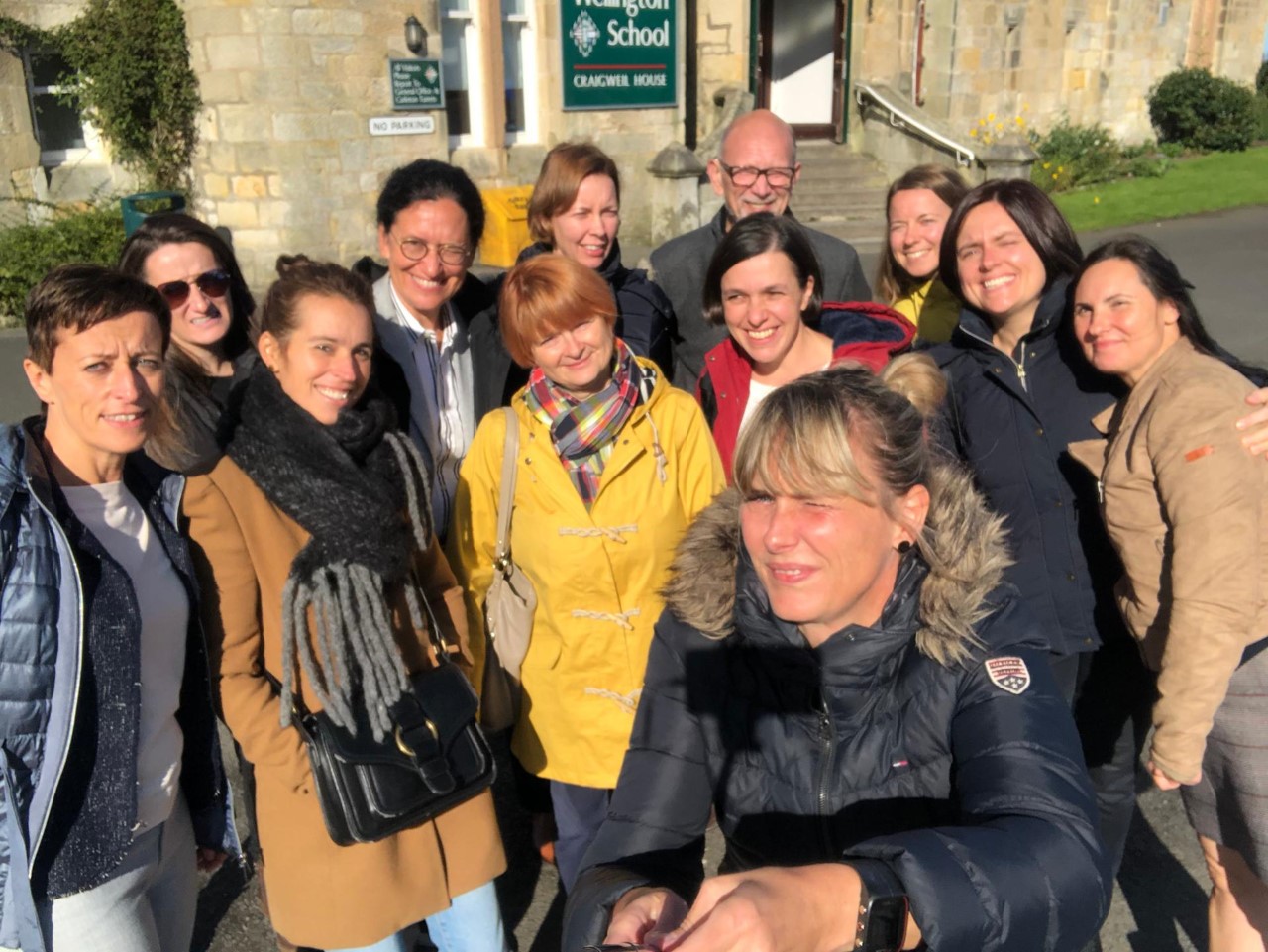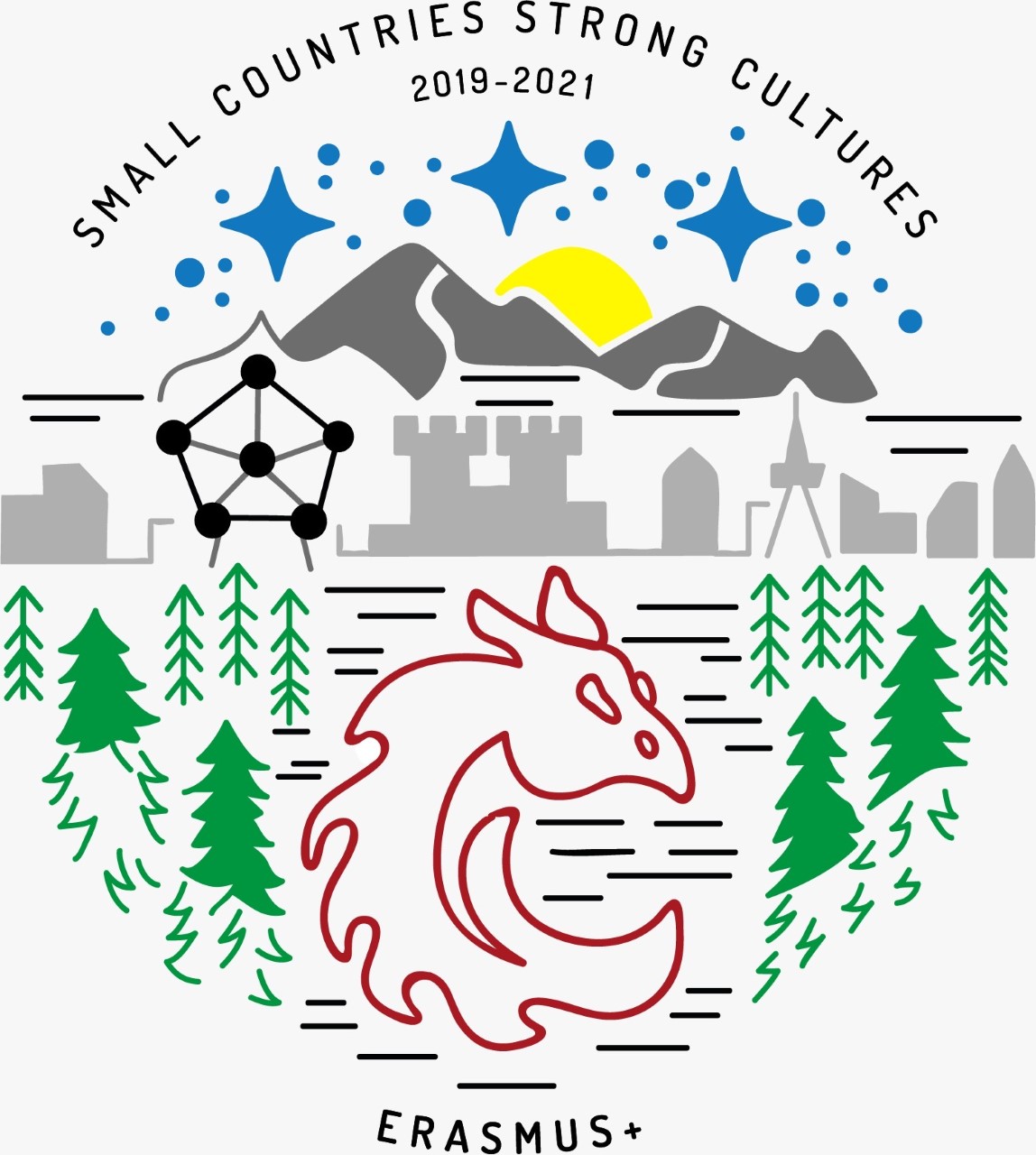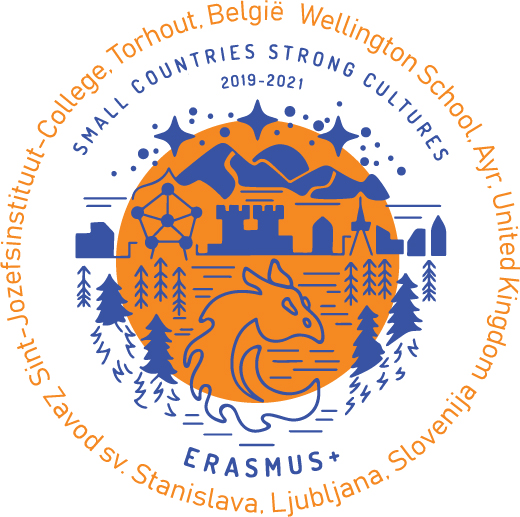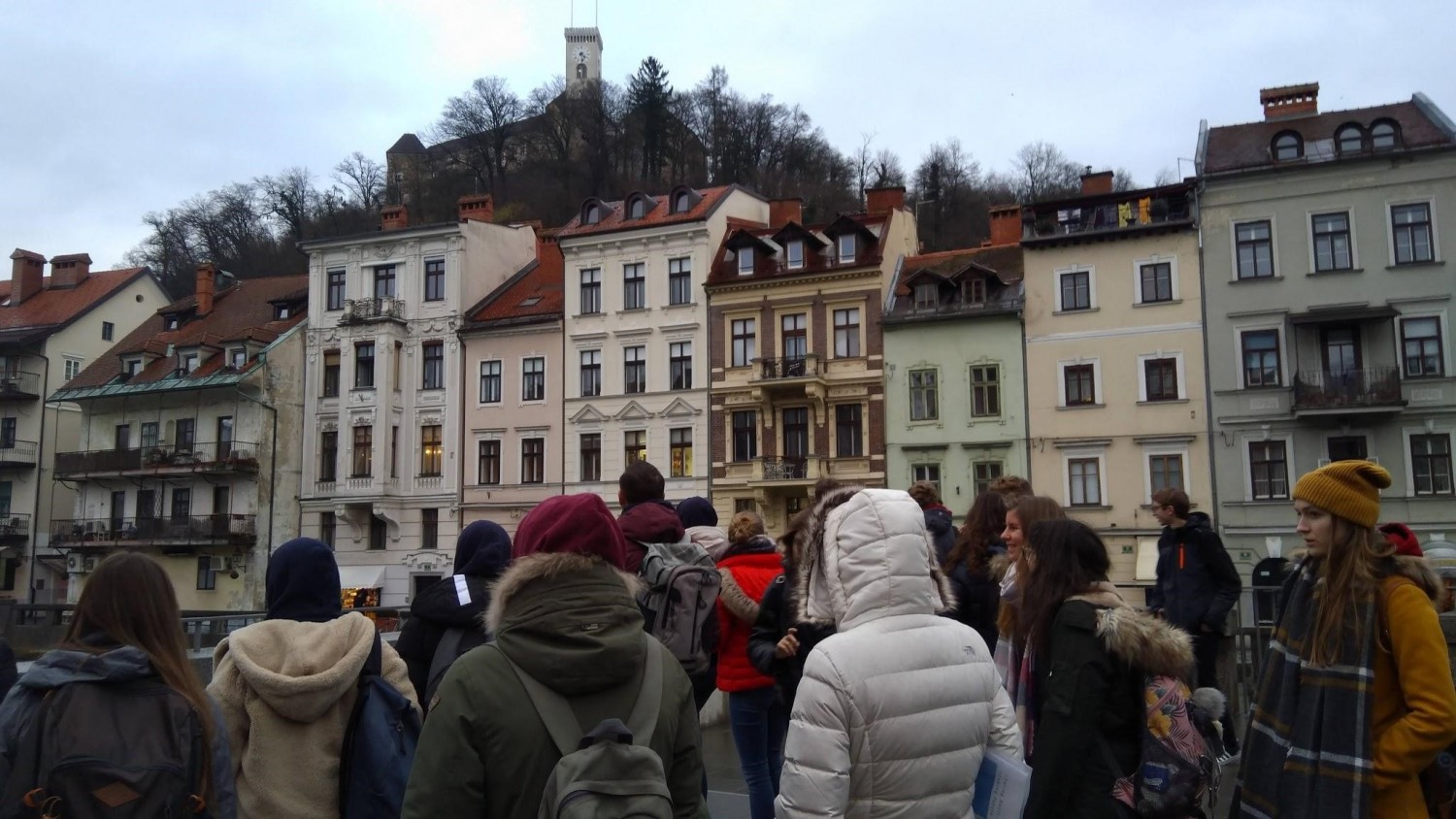Project Coordinator at St. Stanislav’s Institution: Valerija Lah Peternel
Start date: 1. 9. 2019
End date: 31. 8. 2021
Coordinating Institution: Wellington School, Ayr, UK
Partner Institutions:
- St. Stanislav’s Institution, Ljubljana, Slovenia
- Sint-Jozefsinstituut-College Torhout, Belgium
Project in the programme: Erasmus +, KA 2 (schools only)
General Description of the Project:
Small Countries Strong Cultures is a an Erasmus+ project connecting three schools in three countries namely Scotland (the UK), Flanders (Belgium) and Slovenia. The aim of the project is to spread and strengthen the awareness of national cultural heritage and its importance in building a strong European community. With nationalisms on the rise, we want to show the young that they can be loyal to their local community, their country and the EU at the same time – all by learning from the past and being active citizens. /Valerija Lah Peternel, project coordinator/
News about the project:
Erasmus+ (Small Countries Strong Cultures) and UCAPE Conference

From 1st – 6th October 2019 the first staff mobility of the new Erasmus+ project Small Countires Strong Cultures took place at Wellington School in Ayr (Scotland). At the same time the annual UCAPE conference took place with about 80, mainly French teachers, from Catholic primary and secondary schools.
The meetings covering Small Countries Strong Cultures brought together the entire Belgian team from Sint Rembert (Torhout) with their director and deputy head, the welcoming group from Scotland, led by Ms Susan Coontz, and the Slovenian team (Valerija Lah Peternel, Alenka Battelino, Eva Pišljar Suhadolc, Lily Schweiger Kotar). The meetings included finalizing the preparations for the first student mobility which is to take place in Slovenia in February 2020, funding rules for the grant, partnership agreements and taking part in the e Twinning workshop given by Gary Shiells, the representative of the British Council in the UK. One of the highlights of the visit was most definitely the Wellington school students’ performance of Andrew Lloyd Webber’s Phantom of the Opera. The tragic love story was brought to life at The Gaiety Theatre with a lot of musicality, breathtaking special effects and scenery. Friends of Wellington, teachers, parents were justifiably proud of the magic night. Well done Wellington school!
UCAPE whose mission is to build knowledge, values and skills for global citizenship is an international association open to all schools which share the same values. In Ayr the general assembly took place with plenty of opportunities for networking along with new arrangements for the exchanges that were set up. Mr Dominique Bernard, Director of Institution Saint Dominique (France) and the present president of the UCAPE, gave the introductory speech accentuating the fact that if anybody in modern Europe needs to go beyond meeting students’ everyday needs, it is the teachers at Catholic schools. The yearly report followed some interesting presentations of Scottish culture and students’ good practice carried out at Wellington under the supervision of Ms Coontz, a dedicated member of the UCAPE board. /Lily Schweiger Kotar/
Voilà – the new logo for the Erasmus+ project is here!

We are happy to launch the logo for the new Erasmus+ project Small Countries, Strong Cultures. This is a collaborative project binding together three smaller European countries, namely Slovenia, Scotland (the UK) and Flanders (Belgium) in order to make room for the exploration of our common roots as well as for the endeavours to build our common future.
There were 7 logos on the shortlist, created in all three participating countries. The winning logo comes from Flanders and was unanimously chosen, considering students’ and teachers’ preferences. In Slovenia we reached the conclusion via Instagram and it was great fun to observe the online voting. On behalf of the Slovene team we congratulate the Belgian artist for a most suggestive and distinctive logo, representing certain characteristics of all three participating countries. Well done indeed! /Lily Schweiger Kotar/
Voilà – The New Banner for the Erasmus+ Project Small Counties Strong Cultures is Out

The new banner representing the endeavors of the new Erasmus project Small Countries Strong Cultures radiates the vibrant colours of small, yet strong countries, namely Scotland, Bengium and Slovenia. Each country is represented by either its most typical sight, dish or a figure related to Roman times. Thus Belgium shines there through Ambiorix’ statue and unmistakably the best Belgium pralines; Scotland is represented by the Athens of North, Edinburgh, and the slope from Antonine Wall; last but not least Slovenia boasts with the idylic island of Bled and the statue of Emonian Patrician. The project logo naturally assumes the central position and designed by a Beglian student, got a twist with a strong shining orange sun in the middle. The banner was designed by Matic Kotar, the Diocesan Classical Gymnasium alumnus. /Lily Schweiger Kotar/
The week when students from three European countries met to share roots and shape future

As a part of an Erasmus+ exchange, which took place from 9th-13th February 2020, twelve students from Belgium and eight from Scotland visited St. Stanislav´s Institution together with seven teachers from both countries. The title of the exchange was Small Countries Strong Cultures, suggesting that the aim of the project was to strengthen national identity with the young people.
Monday, 10th February – Finding Our Common Ground and Roots
Our guests had already come to Ljubljana the previous day. On Monday, we started the day with a tour of the school and an exhibition of our photographs made as a part of a project Bittersweet memories. For the project we had to photograph items that would remind us of our counties and our roots in case we were forced to flee the homeland. We proceeded with lessons of Slovene and Latin and a presentation of the principle features of a Roman city. After lunch we drove to the city centre to visit the City Museum of Ljubljana and the exhibition of the history of Ljubljana. We ended the day with a trip to the city centre.
Tuesday, 11th February – Having Fun in the Old Days
On Tuesday morning there was a presentation of Saint George, the patron saint of Ljubljana. Then we proceeded with workshops of drawing, dancing, singing and storytelling. Saint George was the topic of all the workshops. In the evening we met around the fire, which was used for cooking our dinner, and we presented what we had done in the workshops. This evening was also the time for playing games and talking with our new friends. Some of the parents joined us as well.
Wednesday, 12th February – Boosting Family Values Through Cuisine
After a concert of a choir and some ensembles from Saint Stanislav´s Institution, we drove to Bled. We walked almost around the entire lake and then visited the town of Radovljica. There we learned how gingerbread is made and we even tried to decorate our own gingerbread hearts. After that we had a lunch. Some traditional Slovenian dishes were served and the owner of the restaurant entertained us with traditional Slovene music. After speeches given by our teachers, we returned home and spent the last evening with our guests, who left the next morning.
Some Students’ Impressions about the Exchange
- During the exchange I learned a lot about Belgian and Scottish history.
- I was introduced to their culture and I greatly improved my knowledge of English language.
- I got some new friends with whom I still have connections on social media.
- I am very happy that I was able to be a part of this exchange.
/Jernej Koman, year 3/
Erasmus + Strong Cultures Small Countries – teacher mobility in St. Stanislav’s Institution

After a long break of two years the time came for small countries and strong cultures to meet again. The Diocesan Classical Gymnasium hosted the teacher mobility from 16th–20th March 2022 joining two teachers from Wellington School Ayr (Scotland), three teachers from Sint-Josefsinstituut Torhout (Belgium) and four Slovene ones (Battelino, Lah Peternel, Pišljar Suhadolc, Schweiger Kotar) from the DCG.
On Thursday a comprehensive tour of Ljubljana took place and on this occasion the Secession guide, devised during one of the Erasmus projects Art Noveau – Art Renoveau, was used again successfully. The schedule for future student mobilities was planned down for autumn 2022. On Friday we listened to two interesting presentations of the subjects which stand the test of time and which all three schools teach in their curricula. These are arts and classical languages and the values they enhance. Our colleague from Scotland presented the concept of Model United Nations (MUN) and we actually carried out a mock security council committee session. In the evening we listened to the concert where Damijan Močnik’s Passio Anno Domini MMXXI, a shocking musical story of the Passion of Christ was told. Saturday was dedicated to getting to know Slovene cultural and national heritage in the Slovene Littoral, namely the Sečovlje salt- pans, where salt is still produced traditionally, with classical salt-pan methods and tools, which is the reason why salt has retained exceptional characteristics. Scotland and Belgium also keep their own ways of producing salt which we will get to know on the next visit. The day was perfectly rounded off by a cup of coffee in sunny Piran.
We are looking forward to new ways of learning from each other and enjoying each other’s company! The student mobilities in August and September to Scotland and Belgium are eagerly anticipated. /Valerija Lah Peternel, school project coordinator/
